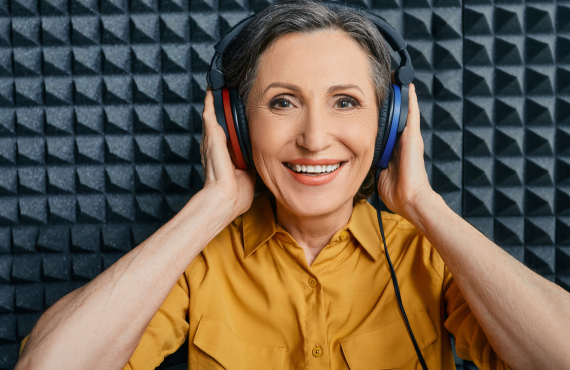
➡ What Is Age-Related Hearing Loss? 🎧
Presbycusis refers to the gradual decline in hearing ability that occurs as people age. It’s one of the most common conditions affecting older adults. Approximately one in three individuals between 65 and 74 experience hearing loss, and nearly half of those over 75 have difficulty hearing.
Causes of Age-Related Hearing Loss 🦻
Several factors contribute to presbycusis:
Changes in the Inner Ear: Degeneration of sensory cells and structures within the inner ear over time.
Cumulative Exposure to Loud Noises: Long-term exposure to loud sounds can damage the hair cells in the ear, leading to hearing loss.
Genetic Factors: A family history of hearing loss may increase the risk.
Health Conditions: Diseases such as diabetes and heart disease have been linked to an increased risk of hearing loss.
Medications: Certain medications, including some antibiotics and chemotherapy drugs, can affect hearing.
Symptoms to Watch For 🔍
Recognizing the signs of hearing loss is crucial:
- Difficulty Understanding Speech: Especially in noisy environments or over the phone.
- Muffled Sounds: Perception that speech and other sounds are muffled or unclear.
- Asking for Repetition: Frequently asking others to repeat themselves.
- Avoidance of Social Situations: Withdrawing from conversations and social gatherings due to difficulty hearing.
- Tinnitus: Ringing or buzzing sounds in the ears.
📚 Related: Does Medicare Cover Hearing Aids
Diagnosis and Treatment Options 🩺
If you suspect hearing loss:
Consult a Healthcare Provider: They will examine your ears for any obstructions or damage.
Audiologist Referral: You may be referred to a specialist for a comprehensive hearing test
Treatment options include:
Hearing Aids: Devices that amplify sounds. Recent advancements have made them more discreet and effective. For instance, Apple’s AirPods Pro 2 have introduced features that allow them to function as hearing aids, providing a more accessible option for some users.
Assistive Listening Devices: Tools like amplified telephones or smartphone apps that enhance sound.
Cochlear Implants: For severe hearing loss, these devices can bypass damaged parts of the ear and directly stimulate the auditory nerve.
Communication Strategies: Techniques such as lip-reading or using visual cues can be beneficial.
Preventive Measures 🛡️
While aging is inevitable, certain practices can help protect your hearing:
Protect Your Ears: Use earplugs or earmuffs in noisy environments.
Manage Health Conditions: Keep conditions like diabetes and hypertension under control.
Regular Hearing Check-ups: Early detection can lead to more effective management.
Healthy Lifestyle Choices: Maintain a balanced diet and exercise regularly to support overall health.
Addressing hearing loss promptly can significantly improve quality of life and reduce the risk of associated issues such as social isolation and cognitive decline. If you or a loved one are experiencing symptoms, seek professional advice to explore the best course of action.
📚 Related: Does Medicare Cover Hearing Aids?




